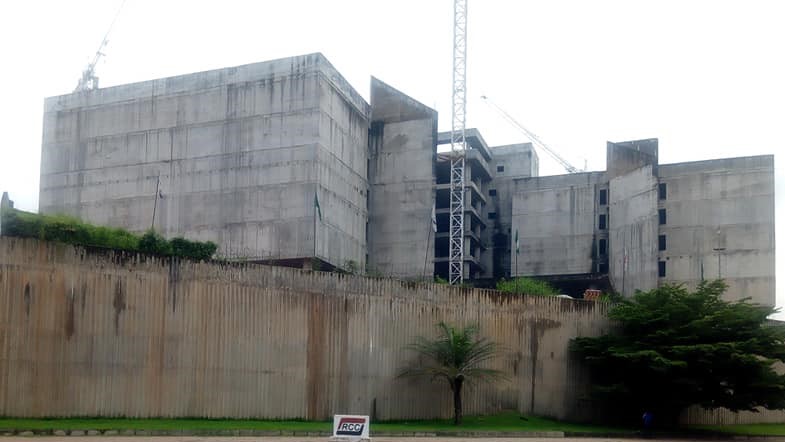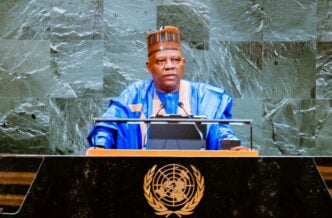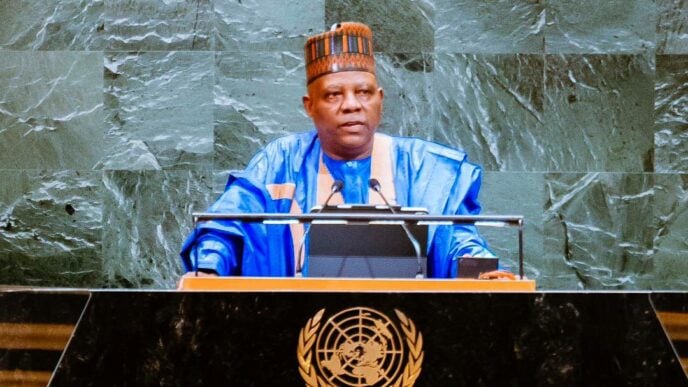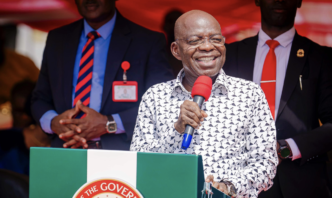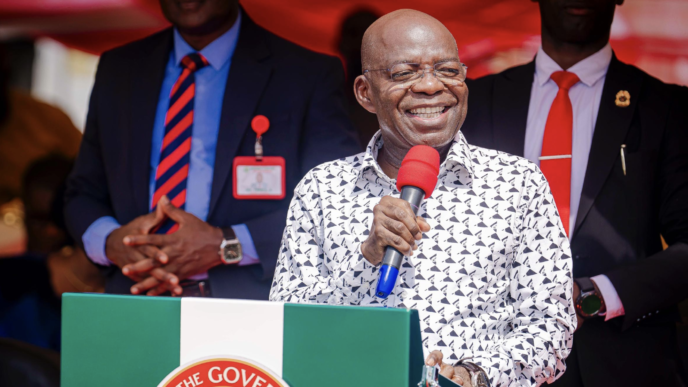Every time I visit Abuja and find myself in the vicinity of the central business district where the National Library is located, my mood often changes as I soon become sad and disillusioned.
Sequestered between the National Mosque and the National Ecumenical Center, the abandoned library sticks out like a sore thumb — a fitting reflection of a country where the menace of abandoned projects reflects a culture of poor leadership and research and a poor understanding of the nexus between institutions such a national library and national development.
The project which started during the former President Olusegun Obasanjo administration, has been left abandoned, overrun by weeds with rusty construction equipment left to the elements.
But is anyone surprised?
Advertisement
The state of the National Library is a metaphor of the decay in our public education today. Take a visit to our schools. The eyesore is mindboggling-infrastructure decay; classrooms like detention centers, empty science laboratories without specimens. Funds budgeted every year for their upgrade ultimately end up in the pockets of administrators.
A National Library is meant to be a repository of knowledge; a storehouse of the best of our country’s intellectual and academic endeavours; where the entirety of a country’s oeuvre are preserved both in print and digital format. But today, it lies comatose while the religious worship centers around it are thriving.
When the construction of the library began in 2006, N8.9 billion was earmarked for the project with an initial completion period of 22 months. But work stopped in 2012. It’s been nineteen years now. In previous years, every attempt to kickstart construction had failed. Problems started with revision of the costs for the completion of the project from N8,590,226, 393.00 to N17 billion, to N38 billion. President Buhari made an attempt to continue the project.
Advertisement
It also failed
That is why when Nigeria’s first lady, Oluremi Tinubu, declared that she would mark her 65th birthday not with adverts or fanfare but with donations to complete the library, I was more than elated. I thought the gesture was commendable. It was a bold move by the first lady because for the first time in nineteen years, this new initiative is without the usual bureaucratic bottleneck that blighted previous attempts.
With this initiative, she turned what could have been the usual fanfare of expensive birthday messages and gifts from herself to society and public good. As at the time of writing this piece her Oluremi@65 Education Fund has mobilised over ₦20.4 billion. According to reports, the monies are being managed by the federal ministry of education, with signatories including the minister of education and the chief librarian of the federation.
Some Nigerians have questioned whether the first lady has gone beyond her role. They have asked why a first lady should have any business with a national library that ordinarily should be the responsibility of the federal government. While the latter concern may have some validity, especially the criticism about the neglect of the project by successive administrations, the first lady intervention should be seen as a last ditch effort to save this national edifice. The criticism cannot take away the fundamental value of what Mrs. Tinubu has done.
Advertisement
To see why the first lady initiative is crucial to saving a dead national asset, we must look beyond our borders and compare with what is obtainable in other climes, where first ladies use their privileged position to revive and build cultural, educational or heritage institutions. These examples are not proof that every such effort is perfect, but they show that Mrs. Tinubu’s initiative is part of a global pattern.
In Ghana during the administration of the Former President Akuffo-Addo, the first lady at the time. Rebecca Akufo-Addo, through her Rebecca Foundation, built ultra-modern libraries in multiple communities under the “Learning to Read, Reading to Learn” initiative. She commissioned libraries; ICT centers and several school-clusters across Ghana. These are smaller in size compared to a national library, but they carry symbolic value: they seek to bring back a reading culture among youths and support government goals for education.
In 2022, Philippines First Lady Liza Araneta Marcos spearheaded the launch of a presidential Library domiciled in part of the National Library luilding in Manila. Her effort provided access to cultural, historical, educational materials and made them more widely accessible to the public.
In Turkey, the first lady, Emine Erdoğan, reopened and dedicated cultural centers — such the one within the Kyrgyz National Library in honour of the novelist Chinghiz Aitmatov, By so doing, Mrs. Erdoğan opened the nexus between culture, literature, heritage and education.
Advertisement
What we have learnt from the above is that first ladies globally often wield soft power; they draw attention when public funds are scarce; they energise donour contribution. The completion of a National Library Abuja is not just for aesthetics. It is an infrastructure of history, archives, books, manuscripts; a central reference point for scholarship; a common good that will outlive generations.
This is why Mrs. Tinubu is right in my judgment. Her asking for donations to complete the library is not a first lady overreach. If anything, it is an indictment that for years, past leadership have failed to deliver an infrastructure that is so critical to our national development. It is a civic responsibility: she used her privileged office to mobilise goodwill to complete a more than a decade old abandoned project of national importance. That she placed the responsibility to oversee the fund under the ministry of education, that signatories on the account are legitimate public officers, is evidence that she is not seeking private glory so much as public legacy. Her critics should acknowledge this.
Advertisement
But looking beyond Mrs. Tituba’s intervention, some concerns came to mind. What happens after the library is completed? First, the long-term operational financing of the library, its staffing, book acquisition, preservation, and digital resources should be the focus of the next stage. The government through the FME must commit budgetary allocations so that once it is completed it does not become another white elephant project to be used for social events. Second, accountability in how the money is disbursed will be critical to avoid accusations of misappropriation.
In a nation where knowledge is too often jettisoned for inordinate accumulation of wealth; where archives are non-existent; where the reading culture is almost dead and where many schools cannot boast of good libraries, the National Library is more than just a building; it is a symbol of national pride. The fact that the project was neglected, the contract inflated and completion not guaranteed makes Mrs. Tinubu’s initiative, especially, worthwhile.
Advertisement
There is, in the end, a moral angle to this discourse, it’s in the fact of a first lady turning her personal celebration into a public gesture as something to admire. But these gestures cannot and must not take the place of the responsibility of the government. If anything, the first lady initiative has brought the attention of Nigerians to the neglect of public infrastructure littered all over the country. The National Library’s project failure should be probed and those responsible for the neglect should be brought to book. If the Library can be finished, stocked with books and function like others in other parts of the world, then the first lady deserves credit.
Advertisement
Views expressed by contributors are strictly personal and not of TheCable.

